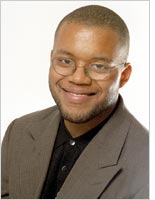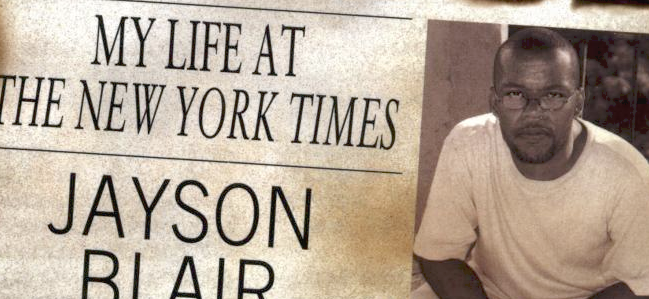Race and the Jayson Blair Scandal
 Last week, I wrote a column looking back at the 10-year anniversary of the Jayson Blair scandal. I talked a great deal about what Jayson Blair did, the impact it had on journalism and where Blair is today.
Last week, I wrote a column looking back at the 10-year anniversary of the Jayson Blair scandal. I talked a great deal about what Jayson Blair did, the impact it had on journalism and where Blair is today.
The goal of the article wasn’t so much to recap every detail of the scandal or every shift that it caused, but rather, to put the scandal in some degree of perspective now that we are far enough away from it to find where it fits in the bigger picture.
But whenever one talks about Jayson Blair, the subject of race inevitably comes up and it’s a subject I’ve largely avoided in my many articles on him. In fact, save briefly debunking Blair’s claims that race helped lead to his misdeeds, I haven’t talked about them at all.
The reason is that the Jayson Blair scandal is already a very charged one to talk about as, even ten years later, the pain still lingers, especially for journalists. The race issues often serve to do little but to throw fuel on the smoldering fire.
Still, the questions are there and have been circulating for over a decade now: What role did race play in the Jayson Blair scandal? Was Jayson Blair allowed hired and promoted quickly because of his race? Would the scandal have happened if Blair were white?
It’s tough to say because no one directly involved has explicitly said and the evidence is, at best, unclear and often contradictory. However, there are at least a few clues that might be able to provide some insight.
The Case Against Jayson Blair
For those wanting to paint the Jayson Blair scandal in a racial light, they often ask a simple question: Why was such a young reporter, one who had a high rate of corrections and a known problem with drugs and alcohol, promoted so quickly to a full-time staffer and given such a prominent assignment (the lead on the Beltway Sniper shootings)?
Diversity had been a pressing issue for The Times for a long period before the scandal. Going back to the 1980s, then-deputy editor Arthur Sulzberger Jr. deemed diversity the “single most important issue” the paper faced and began pressuring managers to actively seek and promote a more diverse workforce.
This push isn’t out of place for The Times, which was a recognized champion of civil rights for decades. It also continued into the 90s when Sulzberger, now publisher of the paper, appointed Gerald Boyd assistant managing editor, making him the first black person to become an editor at the paper (a position he would hold while Blair was at the paper too). Sulzberger also oversaw many other key hires including the first black columnist and the paper’s first black critic.
However, the push for diversity wasn’t just a fairness issue for the paper, it was also a business one. As Jayson Blair points out in his book, the paper was seeking to find greater penetration among different racial groups in the city and that meant both hiring a more diverse reporting staff and also covering news more relevant to historically black areas.
Clearly, The Times was (and seemingly still is) actively seeking, recruiting and promoting black reporters. But does that mean that the paper promoted him primarily due to the color of his skin or turned a blind eye to concerns about him because of race? That seems less likely, especially with all of the other factors in play.
The Prism of Race
The big problem with putting too much emphasis on the role of race in the scandal is simple: Blair was far from the only black reporter at The Times during his tenure.
In his book, Blair repeatedly talks about chatting with and working with other black reporters at the paper and it becomes clear that, though blacks were definitely underrepresented at the paper, the efforts of The Times in the past decade plus had made an impact.
If The Times had been just looking to promote black reporters, there were others to choose from. Blair was clearly singled out, even among black reporters, and the things that made him stand out from that group likely made him stand out from all of the reporters there.
Those things were fairly simple. As Jim Dwyer, a reporter at The Times put it, “Jayson had talent. He had drive. Some people found him charming.”
When Blair did his work, he did it well. He was a clearly driven individual, having already served as the editor of his college paper, though his tenure there was short and scandalous, and even lying about having completed college so he could resume his internship at The Times.
But Blair’s lie about college was just the first of many at the paper. In fact, Blair’s behavior for much of his tenure at The Times bordered on sociopathic. People who behave that way, whether they are clinically sociopaths or not, tend to be very charming and very persuasive. That appears to have been the case for Blair.
Blair, by all accounts, had many friends, including Gerald Boyd, and was generally more loved than hated by his peers until the scandal broke.
For those who claim the paper turned a blind eye to his drug problem, it’s worth noting that Blair went through treatment that he obtained through The Times’ own employee services. Those services are there and have been used by many employees at the paper, of all races, most of which returned to work.
As for Blair’s controversial promotion to a full-time staffer so soon after being placed on probation due to sloppy work, it appears that decision was made, in large part, by Boyd himself, who Blair was close to personally and mentored under. Blair returned the favor in 2001 by nominating Boyd for the award of Journalist of the Year from the National Association of Black Journalists, an award Boyd won.
In the end, it seems it was more office politics than race that got Blair his promotion.
Finally, regarding Blair’s promotion to the head on the Beltway Sniper case, Blair claims, with some credibility, that he was picked for the job because he was born in nearby Columbia, Maryland and had contacts all throughout the region. The Times was struggling with the story as local papers were constantly providing better, more timely coverage.
If Blair’s version of the story is to be believed, he actually wanted to switch to the sports desk at the time and was pulled off that transfer to cover the story for the national desk.
In short, at every turn in Blair’s story, one could choose to look at it as a matter of racial preference though there are other factors that just as easily explain his ascendance.
While it’s difficult to know just how much of a role race really did play, it’s clear that those looking at the matter solely through the prism of race are missing much of the story.
My Personal Belief
Personally, I think it would be naive to say that race played no role at all. Race impacted the Jayson Blair saga as it does so much else in life.
However, it was one factor among many and, knowing what I know about Blair, there are many other forces at play.
But if we’re going to paint what happened in broader strokes, I tend to favor the simpler explanation. Rather than believe there was a widespread conspiracy at The Times to promote an undeserving and dangerous black reporter due to the color of his skin, I tend to think that Blair was a talented, driven but highly unethical reporter that was better at charming coworkers, befriending the right people and playing office politics than he was at honest reporting.
In short, Jayson Blair played the game very well and put himself in a position to have every opportunity journalism could provide him. However, rather than take that chance to make a great name for himself, he destroyed his career with a lack of ethics and severely harmed the paper that had trusted him.
If race had been a serious factor at any point, it was likely because Blair made it one. Though Blair protests the idea that he was an “affirmative action hire” in his book, he goes out of his way to highlight racial issues at the paper. In short, Blair was comfortable using race when he felt it would help him and I have no doubt that he also did that behind the scenes at The Times.
Still, the driving factor was Blair himself. His story isn’t one of a black reporter favored because of his race, but rather, a charismatic man with weak ethics who used all available tools to get what he wanted, whether he deserved it or not.
Bottom Line
In the end, I think the best words about the issue of race and Jayson Blair were actually spoken by Jonathan Landman, the metro editor at the time of the scandal and the editor that famously warned his colleagues that Blair had to be stopped.
After Blair’s resignation, he said:
“There are two conventional wisdoms out there, neither one of them is right. It’s not a morality play about race and affirmative action, as some would like to suggest, and it’s not a story that has nothing to do with race. Race was one factor among many in a subtle interplay.”
With the mishmash of factors that affected the outcome, people are looking at it and seeing very different things, even ten years later.
The truth is that Jayson Blair was a perfect storm and it took a multitude of factors to make it happen. Race likely did play a role, but Blair himself was almost certainly a much bigger factor. After all, a less charming, less driven reporter would not have made it as far as Blair, regardless of the color of their skin.
Perhaps the most disturbing element is that we have to have this conversation about Blair because he was black. When Jonah Lehrer was caught in a similar scandal more recently, race was never introduced as a factor. Other plagiarists have had the same treatment.
In the end, I have to agree with Bob Heber’s piece in The Times a week after the “Correcting the Record” piece published. In it, he said that, “But Mr. Blair is black, so there is the additional spice of race, to which so many Americans are terminally addicted.”
If anything, the racial issue distracts from putting the blame where it belongs: On Jayson Blair himself. That, in turn, may be exactly what Blair wants.
Want to Reuse or Republish this Content?
If you want to feature this article in your site, classroom or elsewhere, just let us know! We usually grant permission within 24 hours.
